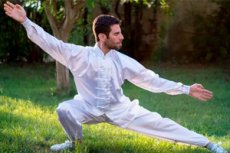Chinese martial arts against Parkinson's disease
Last reviewed: 07.06.2024

All iLive content is medically reviewed or fact checked to ensure as much factual accuracy as possible.
We have strict sourcing guidelines and only link to reputable media sites, academic research institutions and, whenever possible, medically peer reviewed studies. Note that the numbers in parentheses ([1], [2], etc.) are clickable links to these studies.
If you feel that any of our content is inaccurate, out-of-date, or otherwise questionable, please select it and press Ctrl + Enter.

The practice of tai-chi martial arts has a positive effect on the condition of patients suffering from Parkinson's disease, reduces the intensity of motor and non-motor symptoms. This was reported by the staff of Zhujin Hospital, which operates at the Medical College of Shanghai University. The report was published in the Journal of Neurology, Neurosurgery and Psychiatry.
Parkinson's disease is understood as an increasing manifestation of neurodegenerative pathology, which makes itself known by motor retardation, limb tremors, muscle weakness. The incidence of this pathology is constantly increasing, which is primarily due to the lack of effective methods of treatment of the disease. Many scientists for many years have been actively searching for mechanisms to influence the disease, which is necessary to reduce the symptomatology and inhibit the further development of disorders.
Separate studies have suggested that Chinese Tai-Chi martial gymnastics can alleviate the clinical manifestations of the disease for a certain period of time. But no information has been obtained on how long the effect of such treatment lasts.
The researchers formed two groups of patients. Participants in the first group practiced tai chi twice a week for about 60 minutes. The other group received standard therapy that did not include martial arts training. The patients were followed up for five years, with periodic evaluations of the results. Specialists analyzed changes in cardiovascular apparatus, presence or absence of problems with urination, defecation, mood, cognitive activity, muscle function, and sleep quality.
Researchers noted that patients who practiced Chinese exercises had a slower worsening of symptomatology parkinson's disease, thus eliminating the need to optimize antiparkinsonian treatment. Regular adjustment of daily dosage of antiparkinsonian drugs was lower in the first group (71% and 87% in different years compared with 83% and 96% in the second group).
Cognitive abilities deteriorated, but slowly, in the first group of patients, while the quality of sleep and life even improved. The probability of complications was also markedly lower than in the second group.
Parkinson's disease over the years negatively affects the motor and some non-motor abilities of patients, which often leads to disability and adversely affects the quality of life. The positive effects of Chinese martial arts practice are also noted in the long term, prolonging the period of activity and self-care capabilities of patients, improving their quality of life, and reducing the need for some additional medications.
Details of the study can be found by following link to the source pagetitle="Effect of long-term Tai Chi training on Parkinsons disease: a 3.5-year follow-up cohort study | Journal of Neurology, Neurosurgery & Psychiatry">
